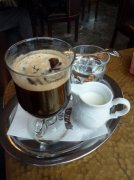Stories and allusions of decaf coffee-- the poet Goethe of decaf coffee

For professional baristas, please follow the coffee workshop (Wechat official account cafe_style)
Coffee can not be tasted by everyone's body. People with palpitations and insomnia have to drink less coffee because of caffeine. Caffeine in coffee can lead to insomnia and emotional excitement. And so on, which makes people who love coffee but can't drink coffee choke their wrists.
Today, the so-called decaffeinated coffee on the market means that the coffee beans are processed before roasting to separate 94% to 98% caffeine, resulting in a significant reduction in caffeine content.
It is said that Goethe, a famous German poet, is also a coffee lover, but he suffers from the pain of being unable to sleep after drinking coffee. The feeling of love but not closeness makes Goethe go to his friend Runge to analyze the composition of coffee beans and find out why coffee interferes with sleep. Around 1820, Longi found out that the factor affecting sleep was caffeine and developed a way to separate coffee beans from caffeine, so Lungi became the ancestor of decaffeinated coffee.
At that time, although Lungi found the factors that affect coffee sleep, the technology of extracting caffeine could not produce decaffeinated coffee in large quantities until 1903, when Ludwig Roselius, a German importer of coffee beans, found that as soon as the coffee beans were soaked in sea water, the caffeine content decreased a lot, so he hired a group of chemists to research and develop the technology of extracting caffeine, which made an important breakthrough in the extraction technology. Decaffeinated coffee is just beginning to be mass produced.
Although Lungi was the first to study the effect of caffeine on sleep, the driving force of low caffeine was Goethe, the great poet.
Important Notice :
前街咖啡 FrontStreet Coffee has moved to new addredd:
FrontStreet Coffee Address: 315,Donghua East Road,GuangZhou
Tel:020 38364473
- Prev

Type Analysis of Cafe | what type of coffee shop do you have?
Professional baristas Please follow the Coffee Workshop (official Wechat account cafe_style) whenever you walk past a coffee shop, the aroma and idleness of the coffee shop always make you want to come in and have a rest. Opening a cafe is a dream that many people have had since childhood. As they get older, some people give up this dream, but others stick to it. The mode of operation of the coffee shop is
- Next

Mazagran americanno American Masakron Coffee allusions and recipe course
Exchange of professional baristas Please pay attention to the casual change of the refreshing flavor of the coffee workshop (official Wechat account cafe_style) with a hint of lemon, like the cool spring breeze and the grass fragrance on the mud after a light rain. Allusion: a long time ago, in an Arab and French battle, an Arab soldier was trapped in the city of Algeria.
Related
- Workers collapse! Lucky suspects that it will introduce freshly cut fruits?!
- 1-point subsidy recipients wear thousand-yuan watches?! Local response: For low-income households
- Can lightly roasted coffee beans be used to extract espresso? How finely should you grind high-quality coffee beans to make Italian latte?
- What is the difference between the world's top rose summer coffee and Yejia Shefi? What are the flavor characteristics of Yega Shefi coffee and Panama rose summer?
- The ceremony is full! Starbucks starts to cut the ribbon at a complimentary coffee station?!
- A whole Michelin meal?! Lucky launches the new "Small Butter Apple Crispy Latte"
- Three tips for adjusting espresso on rainy days! Quickly find the right water temperature, powder, and grinding ratio for espresso!
- How much hot water does it take to brew hanging ear coffee? How does it taste best? Can hot water from the water dispenser be used to make ear drip coffee?
- What grade does Jamaica Blue Mountain No. 1 coffee belong to and how to drink it better? What is the highest grade of Blue Mountain coffee for coffee aristocrats?
- What are the flavor characteristics of the world-famous coffee Blue Mountain No. 1 Golden Mantelin? What are the characteristics of deep-roasted bitter coffee?

